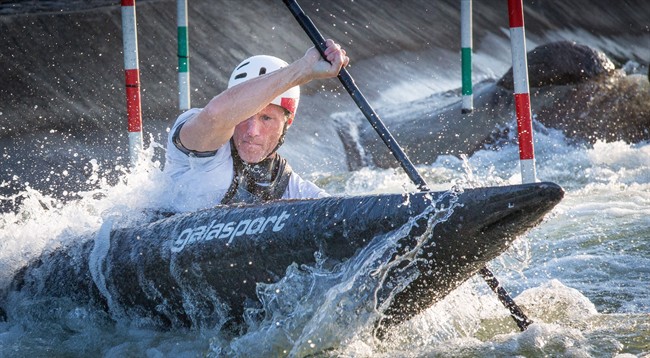Elevate your local knowledge
Sign up for the iNFOnews newsletter today!
Sign up for the iNFOnews newsletter today!
Selecting your primary region ensures you get the stories that matter to you first.

TORONTO – It’s been five years since David Ford was completely stripped of his Canadian sport funding amid not-so-subtle hints he was too old.
He’s 48 now, and the Olympic dream still burns bright in Ford, Canada’s best whitewater kayaker for the better part of three decades.
And why not?
“There’s a bias in people’s minds that age is a number that stops you from performing,” Ford said. “I don’t think you can really look at it that specifically.”
Ford prefers to look at other numbers, like the ones in the weight room. The five-time Olympian can do weighted chin-ups with 112.5 pounds hanging from his waist. He can bench pull — face down, pulling upward — 315 pounds. Both are at least 10-pound improvements over what he lifted in 1999, when he was the world champion.
“When I was younger, my dad also did a bit of racing. I remember being 16, my dad was 36 years old, and I remember thinking ‘I hope he’s OK, he shouldn’t be doing that sort of thing at that age,’” Ford said laughing. “Now I’m 12 years past that day, and still feel amazing.
“The only price I’ve paid I feel like is injuries obviously. Also when I get tired, I can’t fake it anymore. But other than that, I feel better now than I did when I was 25. Sports science has come so far. . . I’ve learned so much more as an athlete that I can apply now that I feel physically much better than when I won my first World Cup.”
Ford has raced for Canada for a whopping 31 years, a trail-blazing career that has seen him reach more than a dozen World Cup podiums. He narrowly missed adding an Olympic medal, finishing fourth at the 2004 Athens Games.
He was sixth at the 2008 Games in Beijing, and then after qualifying the lone Canadian boat for the 2012 London Games, he was sidelined by a ruptured tendon in his elbow.
Along the way, Canada’s sport bosses erased his funding. First, the Canadian Olympic Committee’s Own the Podium program stopped paying him in 2007. Then, Sport Canada cut his carding money — the monthly stipend athletes receive through the Athlete Assistance Program.
“I don’t really understand that thought process, when you have the best guys,” said Ford, who is also eyeing a spot on Canada’s team for the Pan American Games in Toronto. “It’s not like we’re hanging on for carding, we’re doing it because we still have an Olympic dream and we still feel like we have the potential to have great performance.
“I think all Olympians in Canada get really good at doing more with less, and I have a lot of experience, so it becomes easier to do more with less.”
Ford’s most recent financial crisis came when global company Teck Resources laid off 600 people, and his sponsorship with the company was one of the casualties. He considered calling it a career until a chance conversation with former Canadian rugby player Dave Lougheed, a vice-president with global money management company Raymond James.
“He came to get some advice from Kelly about his ski-racing daughters,” said Ford, who is married to former Olympic skier Kelly VanderBeek. “He knew about my career and was surprised to hear what was going on with funding, and he thought he might be able to help.
“He created sort of the ‘Olympic Dream’ as a company, and created 100 shares, $500 a share, and just put it out there to his friends, client list, and we got halfway sold out already, within a week and a half. We’re hoping we can get all the way through the 100 shares, if not farther, which would give me more or less the resources I need to get at least through next spring if not the Olympics.”
Ford and VanderBeek, and their one-year-old son Cooper, live in Canmore, Alta., where VanderBeek is a professional photographer and also works as a broadcaster.
He said his career — whether or not it’s worth it to continue — is an “ongoing discussion.”
“You finish every year and think ‘What are the goals and what’s the price for those goals?’” Ford said. “Kelly is supportive of the fact that I’m still improving, and physically I’m still as good or better than I ever have been. The Olympic dream, it doesn’t go away. It’s still just as strong, and you evaluate whether your chance to do as well as you want to do is there.
“That’s what drives our decision. Every year, my whole career, there are ups and downs and money or no money, and you make your decisions based on whether your dream is still strong enough.”
This site is protected by reCAPTCHA and the Google Privacy Policy and Terms of Service apply.
Want to share your thoughts, add context, or connect with others in your community?
You must be logged in to post a comment.